NREL Internship Engages Native and Minority Students in Cybersecurity Projects
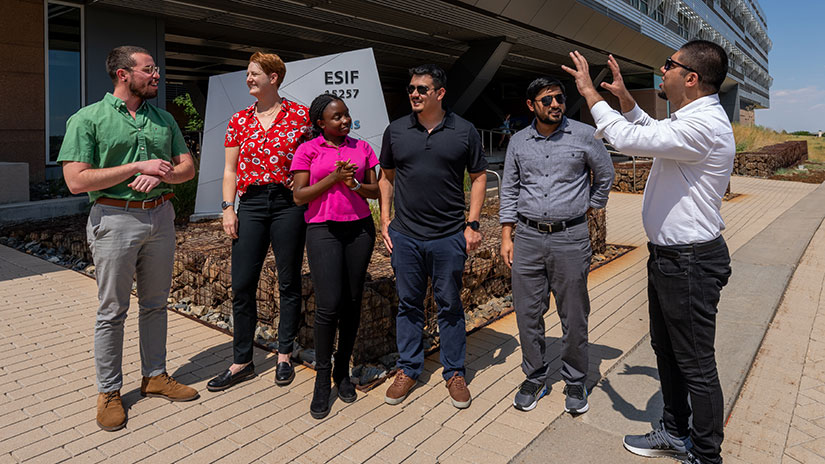
Internships offer students the opportunity to gain valuable experience in their field before joining the workforce—but for interns at the National Renewable Energy Laboratory (NREL), they have the added motivation of contributing to meaningful work in energy efficiency and renewable energy. For interns in the Enabling Native Researchers and Other Minorities Through Graduate Engineering (ENRGE) program, undergraduate and graduate students at minority-serving institutions gain valuable experience in power, energy, and cybersecurity. It is funded by the U.S. Department of Energy National Nuclear Security Administration’s Minority Serving Institution Partnership Program, which aims to create and support a sustainable career pathway that prepares a diverse workforce of talented students to make immediate and significant contributions in science, technology, engineering, and mathematics (STEM) fields.
ENRGE brings undergraduate and graduate students enrolled at minority-serving institutions with underrepresented backgrounds—such as Native, Black, Asian, Hispanic, and Latino Americans—to NREL for hands-on summer internships. The interns work on research projects that look at how human or natural threats may disrupt the U.S. electrical grid, assess the cybersecurity of distributed energy systems, or research pathways to strengthen the U.S. electrical grid.
“Many companies and teams look forward to new pools of student interns, as they'll bring with them fresh ideas, new perspectives, and creative approaches to the projects or processes,” said NREL’s Danish Saleem, senior engineer and ENRGE program leader.
This past summer, Javier Moscoso, Adrian Gomez, Zain ul Abdeen, and Success Oluwole participated in NREL’s second ENRGE summer internship program.
“We were fortunate to have Javier, Zain, Adrian, and Success this year at NREL," Saleem said. "Their exceptional work, dedication, and contributions toward NREL’s clean energy goals was invaluable.”
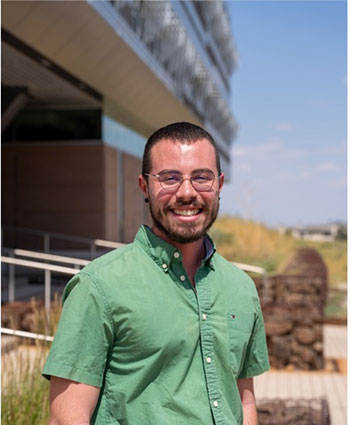
For Javier Moscoso, energy and climate issues hit home—that is, they affect him and all the people of Puerto Rico. “It’s a personal mission,” Moscoso said.
Hurricanes Maria and Fiona wreaked havoc on Puerto Rico in 2017 and 2022. Fiona knocked out power for 80% of the island’s customers who depended on an already fragile power system. Moscoso has witnessed the damage the hurricanes—and the loss of power—cause. He spoke with a woman using an oxygen tank earlier in 2024 about issues she faced when power goes away. She died following a power outage this summer. “I’m talking because I live this,” he said.
The ENRGE internship allows Moscoso to work on important cybersecurity projects, but it also allows him to talk with NREL people—like Laboratory Director Martin Keller, who Moscoso met with earlier this summer—about the issues Puerto Rico faces. “Not having a strong cybersecurity background before coming here, I have felt comfortable with my team, and I was always eager to learn more and get out of my comfort zone,” Moscoso said. “It gives me the opportunity to test out what I like and see new things that I maybe didn’t think I would ever like or work with. I have come to familiarize myself with cybersecurity and how crucial it is in power systems today. If I’m honest, I have come to appreciate how impactful this experience will be for my future. I think there is no better place than NREL to be exposing myself to this through many readings, workshops, and conversations with mentors. I look forward to continue learning and contributing in the best way I can."
Moscoso’s work at NREL involves looking at the cybersecurity of utility-scale batteries and distributed energy resources (DER) deployment for underserved communities on separate projects. He completed a literature review on the cybersecurity of DERs, and his background informed the case studies he wrote on Puerto Rico. “It’s my opportunity to give visibility to Puerto Rican communities,” he said.
Moscoso said that there is intention to everything he does, which is why the ENRGE internship was enticing. It allowed him to bring his personal story and experience to NREL, which he will then take back to Puerto Rico. Encouraged by his time at NREL and with ENRGE, he will begin graduate school in Puerto Rico, where part of his time will be spent continuing a renewable energy project he began before coming to NREL.
Prior to arriving at NREL, Moscoso engaged other students on the design and architecture of a solar gazebo to be constructed at the University of Puerto Rico at Mayagüez. The gazebo will provide power on campus for students in the event of an outage. Moscoso has presented on this project at NREL and to many national outlets. The project includes an educational component where talks will be given on renewable energy and energy consumption.
What started as a napkin drawing is morphing into a reality that will benefit other Puerto Ricans, and Moscoso hopes that this first gazebo can be replicated across the island.
“Javier serves as an excellent example of someone who took full advantage of the networking and professional development opportunities that NREL and the ENRGE internship offered,” said NREL’s Chelsea Neely, cybersecurity researcher and ENRGE program coordinator. “Almost every week, he came to me to tell me who he met at NREL and what research and development opportunities he was excited about. We are so proud of the impact he has made here at NREL and can’t wait to see him continue his mission towards clean energy transformation.”
Exploring a New Career Pathway
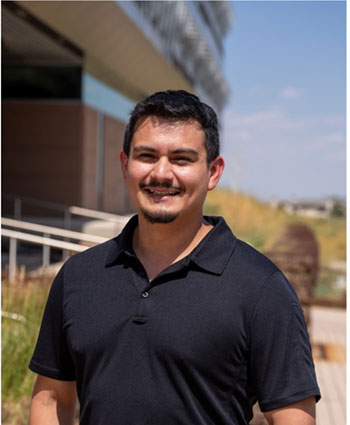
The path to NREL was not a straight line for Adrian Gomez. From the U.S. Army to education in criminal justice, his background was outside of energy. When Gomez decided that the criminal justice route was not what he wanted, he enrolled in the Ecotech Institute to learn about sustainable technologies.
Then the school closed permanently.
Gomez returned to criminal justice briefly before he learned about ENRGE. When he found the ENRGE internship opportunity at NREL, it felt like a fit. “It’s the right choice,” he said. "Everything led up to this. This is something I can do.”
At NREL, Gomez brings a cybersecurity background to the Clean Energy Cybersecurity Accelerator—which aims to expedite the deployment of novel or emerging operational technology security solutions—and learned from researchers involved in the cybersecurity situational awareness tool designed for renewable energy systems. For the Clean Energy Cybersecurity Accelerator, Gomez researched cyberattack scenarios involving solar panels and what types of attacks might cause disruptions.
“It’s interesting to see how everything is interconnected—how everything in a system affects everything else,” Gomez said. Researching cybersecurity has made Gomez hyperaware of cybersecurity concerns. He is paying attention to what is happening in the world in that regard. “I’m vigilant about those interconnections and how my role in cybersecurity is involved in that sphere.”
Following the ENRGE internship, Gomez will return to school to pursue a master’s degree in cybersecurity.
“For someone new to research, Adrian embraced the uncomfortable, often nonlinear path his research took him down this summer,” Neely said. “I was impressed with his ability to take on new concepts and come away from this experience with research he felt proud of. With the encouragement of researchers at NREL, we’re thrilled to hear he’s decided to pursue an advanced degree in cybersecurity. We can’t wait to see what the future holds for him as he builds on the skills he has learned here at NREL.”
Meeting the Challenges of Cybersecurity Through Computational Science
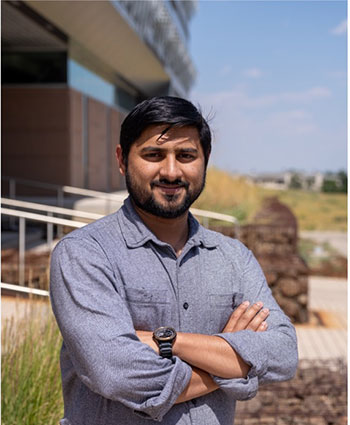
Zain ul Abdeen came to NREL with a background in machine learning and artificial intelligence through a previous internship in NREL’s Computational Science Center, which comes in handy when asked to anticipate and respond to cyberattacks on power systems. Zain had worked as a computational scientist prior to arriving at NREL, and his computational skills were put to good use on cybersecurity projects.
Zain helped to test the performance of power system algorithms during adversarial attacks and built a model to detect anomalies in the system. With both, Zain was able to apply computational knowledge to specific challenges in cybersecurity. “We considered various kinds of attacks on the grid and how the algorithm was affected and how another model performed at detecting the attack,” he said.
A key component of Zain’s work is training models well enough that they are trustworthy when it comes to detecting and responding to attacks. That means designing robust systems that are well trained on possible scenarios and attacks.
“ENRGE is so well structured, and the mentors are very helpful,” he said. “They’re always there to help you solve a problem in your research. They listen, provide guidelines, and guide you in the right direction.”
“Zain’s final presentation of his projects this summer were incredibly impressive,” Neely said. “He made a big impact on his projects in such a short period of time. His successes clearly reflect the strong relationships he built with his mentors, Dr. Shuva Paul and Dr. Vivek Singh. We were very lucky to have his talents in the cybersecurity center this summer, and I can’t wait to read his next publications!”
Seizing an Unexpected Opportunity
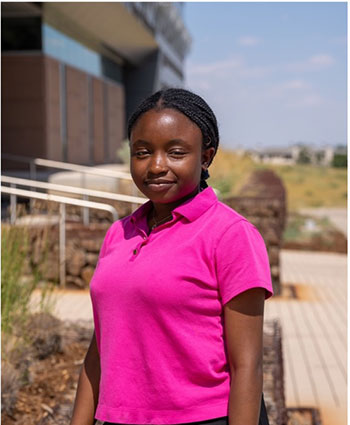
When Success Oluwole went to her mentor and mechanical engineering department chair at Alabama Agriculture and Mechanical University, she asked him to keep his ears open for relevant opportunities. He called her up one day and directed Oluwole to an opportunity in the ENRGE program.
“I noticed it was a cybersecurity position and I'm quite in the mechanical engineering field,” she said. “So, I remember saying, ‘I'm not sure if this is the right fit for me.’”
The chair told Oluwole that she should not think like that—that she should be open to opportunities, even if the fit is not a direct match for her experience.
She applied to the ENRGE program. “I have always wanted to work at a national lab because I have research experience and working at the lab will give me more opportunities to do research full time,” she said.
When she interviewed for the role, it was the first time Oluwole had been interviewed by a panel, and she was nervous but optimistic, she said. When the offer came, Oluwole jumped at it. “The program gives people from minority communities the opportunity to work at a national lab. I’m Nigerian, and not many international students like me who come to this country have this opportunity. I knew working at NREL would be a great stepping stone for my career.”
Oluwole quickly realized that there was overlap between cybersecurity and mechanical engineering. She said she had the notion that there would be a lot of coding, but the actuality of the cybersecurity projects she worked on allowed her to use skills she brought with her to NREL.
She was able to deploy project management experience—data collection and budgeting—to help coordinate Liberty Eclipse, an annual full-scale cybersecurity preparedness exercise run by the U.S. Department of Energy. Oluwole also worked on a project involving cyber-informed engineering (CIE), which provides engineers a framework to integrate cybersecurity into the early design stages and throughout the life cycle of engineered systems. “I've been trying to apply the principles of CIE to the design, development, and operations of the wind turbines in the United States. I've been trying to apply the 12 principles of CIE to basically each level of a wind turbine,” she said.
“Success truly blossomed during her 10 weeks here at NREL,” Neely said. “She did a fantastic job collaborating with her mentor and I could tell she was really open trying things outside of her comfort zone. The fact that she left her experience better able to understand how cybersecurity affects her work as a mechanical engineer is a huge win for all of us. I feel so privileged to witness her growth and can’t wait to see what the future has in store for such a promising young researcher.”
Oluwole values the experiences she is gaining in the ENRGE program.
“Every single day since I started my internship here, I have been grateful, because this has been a blessing,” she said. “This program has been transformative. I’ve met great people. I’ve been able to apply my academic knowledge. I hope the program grows so that other people from minority communities can have the opportunities to learn like I have this summer.”
Before joining NREL, Oluwole did not have cybersecurity as a potential career path, but she is glad she has been able to gain this experience in an unexpected field.
ENRGE began with one intern in 2023 and has grown to four interns, two of whom have decided to pursue higher education as a result of their time in the program.
“Coming from diverse engineering and technical backgrounds, ENRGE interns learned to appreciate the importance of taking an interdisciplinary approach to the cybersecurity of energy systems,” Neely said. “Each of them has a very bright future as leaders in this important field. I hope their experience at NREL influences how they design and build critical cyber-physical systems of the future.”
Learn more about NREL’s internship opportunities.
Last Updated May 28, 2025
